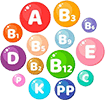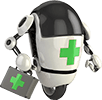| Autoimmune markersBlood biochemistryCancer markersCoagulogramCoprogramElements and vitaminsGeneral blood testGeneral urine testInfection testsOther hormonesSex hormonesSpermogramThyroid hormones |
Transcript of tests for vitamins and trace elements online 
|
| Enter date of birth and gender |
Did you find an error in the definition of norms? Miss something important? Write to us.
Water-soluble vitamins
- Vitamin B1 (thiamine) is necessary for normal metabolism, energy production, and the functioning of the neuromuscular system. Thiamine deficiency, which occurs with poor nutrition and excessive alcohol consumption, leads to Korsakov-Wernicke syndrome and vitamin deficiency B1.
- Vitamin B2 (riboflavin) - is necessary for the formation of red blood cells, antibodies, for the regulation of growth and reproductive functions in the body. It is also necessary for the health of the skin, nails, hair growth and in general for the health of the whole body, including thyroid function. Deficiency causes vitamin deficiency B2.
- Vitamin B3 (nicotinamide, niacin) - is necessary for energy metabolism, amino acid assimilation, normalization of cholesterol, plasma triglycerides, maintenance of the functions of the nervous and cardiovascular systems. With a lack of niacin, pellagra develops.
- Vitamin B5 (pantothenic acid) - participates in metabolic processes, development and development of body cells (especially the central nervous system). Deficiency leads to dermatitis, depigmentation and hair loss, as well as disorders of the nervous system, coordination of movements, functions of the heart and kidneys, stomach, intestines.
- Vitamin B6 (pyridoxine, adermine) is a group of derivatives of 3-hydroxy-2-methylpyridines that are involved in many metabolic reactions (including enzymatic ones), affects the nervous, hematopoietic and immune systems.
- Vitamin B7 (biotin) is a cofactor of the five most important carboxylases involved in the synthesis and catabolism of fatty acids, amino acid metabolism, gluconeogenesis. Deficiency of this vitamin is practically not found.
- Vitamin B9 (folic acid) is one of the B-complex vitamins, vital for hematopoiesis and proper fetal development. With a deficiency, megaloblastic anemia develops.
- Vitamin B12 (cyancobalamin) is necessary for the functioning of the nervous system, optimization of hematopoiesis processes, as well as for DNA synthesis. With a deficiency, b12-deficiency anemia develops.
- Vitamin D3 (colecalciferol) is synthesized in humans in the skin under the action of ultraviolet rays of the B range, and also comes from food. The main purpose is to ensure the absorption of calcium and phosphorus from food in the small intestine. Pronounced vitamin D deficiency leads to rickets
Fat-soluble vitamins
- Vitamin K1 (phylloquinone) - supports normal blood clotting, promotes bone mineralization. Vitamin K deficiency is manifested by bleeding and a decrease in bone strength, osteoporosis.
- Vitamin E (tocopherol) is a group of biologically active substances that prevent the oxidation of polyunsaturated fatty acids, participate in the synthesis of hemoglobin, prevent the formation of blood clots. Tocopherol deficiency is a very common phenomenon. Deep hypovitaminosis is rare - mainly in premature infants (manifested by hemolytic anemia). With E-vitamin deficiency, partial hemolysis of erythrocytes is observed, the activity of antioxidant defense enzymes decreases in them.
- Vitamin A (retinol) is necessary for the normal functioning of the immune and reproductive systems, preservation of visual acuity, integrity of epithelial cells. Vitamin A deficiency, accompanied by night blindness, anemia, chronic infections, as well as for the diagnosis of intoxication with hypervitaminosis.
Trace elements
- Iron (Fe) is necessary for the normal functioning of the immune and reproductive systems, preservation of visual acuity, integrity of epithelial cells. Vitamin A deficiency, accompanied by night blindness, anemia, chronic infections, as well as for the diagnosis of intoxication with hypervitaminosis.
- Iodine (I) is a vital element that is part of thyroid hormones: thyroxine (T4) and triiodothyronine (T3). Severe iodine deficiency can lead to thyroid pathology (goiter, hypothyroidism, cretinism with severe deficiency during intrauterine and neonatal development), delayed development of children, decreased fertility. Excess iodine leads to thyroid pathology, skin and respiratory tract lesions, fatigue, weakness, depression.
- Aluminum (Al) - refers to trace elements, there is no shortage. The most common cases of aluminum intoxication were observed in patients with chronic renal failure when exposed to aluminum-containing substances during treatment.
- Gold (Au) - has an antiseptic effect on viruses and bacteria, participates in the immune processes of the body, and is also involved in the binding of hormones in tissues. The body contains a small amount, there is no shortage. Intoxication occurs only with a very significant excess of the norm. Usually, the study is carried out with therapy with gold preparations.
- Cadmium (Cd) is a toxic trace element. Intoxication is usually associated with industrial pollution.
- Cobalt (Co) is a component of A href='/?p=32509' vitamin B12, necessary for DNA synthesis, hematopoiesis, nervous system functioning and many other processes. Cobalt deficiency is the cause of severe diseases: pernicious anemia (Adisson-Biermer disease), funicular myelosis, megaloblastic anemia in diphyllobothriosis (infection with broad tapeworm). But the excess of cobalt during contact is also manifested by pulmonary fibrosis, hyperkeratosis, myocardiopathy and hypothyroidism.
- Manganese (Mn) is a vital element, is part of many metalloenzymes, and also acts as a nonspecific enzyme activator. Manganese deficiency can cause improper artificial feeding, which is accompanied by signs of bone demineralization and growth disorders. Experimental restriction of manganese in food led to the development of skin lesions and a decrease in cholesterol levels in humans. Excess manganese is manifested by neurotic syndromes, increased fatigue, rickets, hypothyroidism.
- Copper (Cu) is a vital trace element that is part of a number of proteins, peptides, etc. Of clinical significance are manifestations of copper deficiency, poisoning and genetic defects in copper metabolism (including Menkes syndrome (curly hair disease), Konovalov-Wilson disease , aceruloplasminemia), leading to its excess.
- Molybdenum (Mo) is a vital trace element that is part of some metalloenzymes involved in the functioning of cytochrome C, purine metabolism, etc. Deficiency occurs only with prolonged parenteral nutrition. Molybdenum poisoning in humans has not been described.
- Arsenic (Mo) is a toxic metal that participates in metabolism in microdoses. There is no shortage. The source of arsenic intoxication may be occupational industrial exposure or ingestion of pesticides. Manifestations - gastrointestinal symptoms, possible seizures and coma, respiratory and cardiac arrhythmias. Chronic exposure causes damage to the skin and mucous membranes, changes in the nervous system.
- Nickel (Ni) is a toxic metal that is part of the structure of some proteins. There is no shortage. Toxic effects: dermatitis - nickel scabies and carcinogenic effects (respiratory organs). Sources of chronic nickel exposure are the production of inks, magnets, paints, stainless steel, enamels, ceramics, batteries, glass and alloys. Inhaled nickel salts, especially from cigarette smoke, linger in the bronchi for a long time.
- Mercury (Hg) is a toxic metal. Sources of intoxication are industrial pollution (production of chlorine, alkalis, electrical industry, pharmaceutical production, pulp and paper production), mercury in medical devices, coal burning, medicines containing mercury fungicides. Occupational poisoning by mercury vapor is mercurialism.
- Lead (Pb) is a toxic metal. Sources of intoxication are domestic (dilapidated buildings, paints, polluted water) and industrial. It can accumulate in the bone tissue. Occupational lead poisoning, in which a lead color develops (earthy-pale skin color), lead anemia, a lead border on the edges of the gums and lips, increases the risk of arterial hypertension, and worsens the course of chronic kidney diseases.
- Selenium (Se) is a vital trace element. It is important for normal thyroid function and normal functioning of the immune, reproductive, cardiovascular and nervous systems. Selenium deficiency may be associated with its deficiency in food, as well as with nutritional and digestive disorders. Keshan's disease is associated with a pronounced selenium deficiency. Symptoms of toxic effects of excess selenium are manifested in the appearance of a garlic smell when exhaling and from urine, metallic taste, headaches, nausea, hair loss and nail damage. Possible loss of sensitivity, seizures, pneumonia, pulmonary edema and cardiovascular collapse.
- Thallium (Pb) is a toxic metal whose microdoses are involved in metabolism. Sources of intoxication - medicines, rat poison, some fungicides and pesticides, in metallurgical plants, chemical plants and power plants. Symptoms of acute poisoning include vomiting, nausea, abdominal pain, diarrhea, gastrointestinal bleeding, pulmonary edema.
- Zinc (Pb) is a part of many enzymes, participates in the synthesis of proteins and nucleic acids, which ensures proper cell growth and differentiation. Zinc deficiency rarely occurs during fasting: decreased immunity, impaired wound healing, slower growth and mental development, anemia, decreased vision, hormonal disorders. Excess may occur when its amount in food increases (for example, from galvanized containers).
Clinics for research
To specify the price and services, select the subsection at the beginning of the page.
-
3.5€
+7(495..show+7(499) 11-68-239Добромед на Грекова
+7(495) 228-03-43
+7(499) 479-16-91
+7(499) 479-10-11
Москва; ул. Грекова, д. 5; M. Медведково -
4.9-18€
+7(383..show+7(499) 11-68-239Астра-Мед на Николаева
+7(383) 347-63-63
Новосибирск; ул. Николаева, д. 11/5; M. Речной вокзал -
4.9-18€
+7(383..show+7(499) 11-68-239Астра-Мед на Титова
+7(383) 347-63-63
Новосибирск; ул. Титова, д. 246/2; M. Речной вокзал -
5-45€
+7(383..show+7(499) 11-68-239Аванта-Мед на Державина
+7(383) 349-93-03
Новосибирск; ул. Державина, д. 77/1; M. Березовая роща -
5.5-55€
+7(383..show+7(499) 11-68-239МЦ Лада на Бориса Богаткова 245
+7(383) 383-08-59
Новосибирск; ул. Бориса Богаткова, д. 245; M. Золотая нива -
5.9-16.5€
+7(383..show+7(499) 11-68-239Аперто Клиник на Даргомыжского
+7(383) 349-33-41
Новосибирск; ул. Даргомыжского, д. 8Г; M. Заельцовская -
6-21€
+7(495..show+7(499) 11-68-239Дельта Клиник в Наставническом переулке
+7(495) 135-05-92
Москва; Наставнический пер., д. 6; M. Курская -
6-21€
+7(495..show+7(499) 11-68-239Дельта Клиник в Сыромятническом переулке
+7(495) 432-01-59
Москва; 2-й Сыромятнический пер., д. 10; M. Чкаловская -
6€
+7(496..show+7(499) 11-68-239Клиника доктора Шаталова в Орехово-Зуево на Ленина
+7(496) 425-03-03
+7(800) 555-90-10
+7(991) 314-25-03
Орехово-Зуево; ул. Ленина, 84; -
6€
+7(495..show+7(499) 11-68-239Клиника Андрологии во 2-м Сыромятническом переулке
+7(495) 916-13-30
+7(495) 916-23-17
+7(495) 916-07-35
Москва; 2-й Сыромятнический пер., д. 10; M. Чкаловская -
6.2-22.5€
+7(498..show+7(499) 11-68-239ЦБЭЛИС в Жуковском
+7(498) 484-21-02
Жуковский; ул. Дзержинского, д. 16; -
7-7.5€
+7(495..show+7(499) 11-68-239Ниа-Мед на Новороссийской
+7(495) 358-22-74
+7(964) 512-84-89
Москва; ул. Новороссийская, д. 25, корп. 1; M. Люблино -
7-16.5€
+7(843..show+7(499) 11-68-239Поликлиника Спасение на Патриса Лумумбы
+7(843) 580-17-54
Казань; ул. Патриса Лумумбы, д. 4; M. Суконная слобода -
8.9-31€
+7(495..show+7(499) 11-68-239МедикСити на Полтавской
+7(495) 604-12-12
Москва; ул. Полтавская, д. 2; M. Савеловская -
9.9-45.4€
+7(495..show+7(499) 11-68-239Поликлиника.ру в Столярном переулке
+7(495) 925-88-78
Москва; Столярный пер., д. 7, корп. 2; M. Улица 1905 года -
9.9-45.4€
+7(495..show+7(499) 11-68-239Поликлиника.ру в 1-м Смоленском переулке
+7(495) 925-88-78
Москва; 1-й Смоленский пер., д. 17, стр. 3; M. Смоленская -
10.7-18.8€
+7(495..show+7(499) 11-68-239ВТМ в Люберцах на Митрофанова
+7(495) 565-48-08
+7(495) 565-48-09
Люберцы; ул. Митрофанова, д. 11А; M. Жулебино -
11.4-176€
+7(499..show+7(499) 11-68-239Он Клиник Бейби на Воронцовской 13/14
+7(499) 519-30-94
+7(495) 266-85-71
Москва; ул. Воронцовская, д. 13/14; M. Таганская -
12.2-26.6€
+7(495..show+7(499) 11-68-239Медицинский центр Минфина России
+7(495) 987-91-05
+7(495) 623-53-72
+7(495) 987-97-37
Москва; ул. Ильинка, д. 9, стр. 1; M. Китай-Город -
150€
+7(495..show+7(499) 11-68-239СкороМед на Беломорской
+7(495) 212-23-94
Москва; ул. Беломорская, д. 26; M. Беломорская - More clinics - 2815. Use filters
Category - medicine

